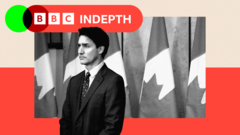The once-stalwart national consensus on immigration is being fundamentally challenged as new data shows a striking shift in Canadian attitudes. Over the past few years, concerns surrounding housing shortages and soaring rents have intertwined with rising public sentiment against the growing number of immigrants. This growing unease is speculated to have played a role in Justin Trudeau's resignation as Prime Minister on January 6, after nearly a decade in power. His departure coincides with a time of heightened debate over immigration, leading many to question if the arrival of Donald Trump in the U.S. could further exacerbate these tensions.
In regions such as Brampton, Ontario, rental costs have skyrocketed, and prospective tenants are met with absurd listings. One ad described a small bathroom turned bedroom, attracting criticism and sparking discussions about the state of affordable housing across Canada. Reports state that 2.4 million families are now living in inadequate conditions, fueling resentments about immigration as people struggle to find affordable places to live amidst a rental market that has seen significant increases, with rents rising nearly 20% over recent years.
The perception of immigration as a burden is surging among Canadians, a departure from their historically welcoming stance. In a 2022 survey, only 27% voiced concerns over immigration levels, a figure that shot up to 58% by 2024. Protests against immigration have erupted in major cities, with organizers expressing frustrations over what they perceive to be a lack of accountability in managing newcomers in the face of austerity.
With Trudeau resigning at a time when his approval rating plummeted to 22%, his administration confronted accusations of failing to adequately respond to public concerns regarding inflation and housing. Directly linking immigration to these social issues, critics argue that he misplaced focus on high immigration targets that were believed to stimulate economic growth. It's noted that over 90% of the population growth recorded since the pandemic has been attributed to immigration.
The impending threat of Trump's return to power looms large in Canadian discourse. Trump's rhetoric and policies on immigration could have ripple effects across the border, especially as immigration rhetoric intensifies in Canadian politics. Conservative leader Pierre Poilievre's viewpoints reflect a growing sentiment, advocating for reducing new immigrant arrivals until housing supply catches up.
However, the belief that anti-immigrant sentiment may gain traction in Canada is countered by many who see the country as fundamentally multicultural. Historical patterns show that a significant portion of the Canadian populace is either first or second generation immigrants. Groups advocating for continued immigration stress the irreplaceable role newcomers play in Canada’s cultural fabric and economic dynamism.
As the political landscape shifts, Trudeau’s attempt to alleviate concerns by proposing a 20% reduction in immigration levels over the next three years raises more questions than answers regarding long-term immigration policies. With voters seemingly torn between economic concerns and their traditional openness to new arrivals, the future of Canadian immigration is subject to critical scrutiny as public opinion continues to evolve. Only time will tell whether Canada can navigate this storm or if the shadows of anti-immigration sentiment will expand further.
In regions such as Brampton, Ontario, rental costs have skyrocketed, and prospective tenants are met with absurd listings. One ad described a small bathroom turned bedroom, attracting criticism and sparking discussions about the state of affordable housing across Canada. Reports state that 2.4 million families are now living in inadequate conditions, fueling resentments about immigration as people struggle to find affordable places to live amidst a rental market that has seen significant increases, with rents rising nearly 20% over recent years.
The perception of immigration as a burden is surging among Canadians, a departure from their historically welcoming stance. In a 2022 survey, only 27% voiced concerns over immigration levels, a figure that shot up to 58% by 2024. Protests against immigration have erupted in major cities, with organizers expressing frustrations over what they perceive to be a lack of accountability in managing newcomers in the face of austerity.
With Trudeau resigning at a time when his approval rating plummeted to 22%, his administration confronted accusations of failing to adequately respond to public concerns regarding inflation and housing. Directly linking immigration to these social issues, critics argue that he misplaced focus on high immigration targets that were believed to stimulate economic growth. It's noted that over 90% of the population growth recorded since the pandemic has been attributed to immigration.
The impending threat of Trump's return to power looms large in Canadian discourse. Trump's rhetoric and policies on immigration could have ripple effects across the border, especially as immigration rhetoric intensifies in Canadian politics. Conservative leader Pierre Poilievre's viewpoints reflect a growing sentiment, advocating for reducing new immigrant arrivals until housing supply catches up.
However, the belief that anti-immigrant sentiment may gain traction in Canada is countered by many who see the country as fundamentally multicultural. Historical patterns show that a significant portion of the Canadian populace is either first or second generation immigrants. Groups advocating for continued immigration stress the irreplaceable role newcomers play in Canada’s cultural fabric and economic dynamism.
As the political landscape shifts, Trudeau’s attempt to alleviate concerns by proposing a 20% reduction in immigration levels over the next three years raises more questions than answers regarding long-term immigration policies. With voters seemingly torn between economic concerns and their traditional openness to new arrivals, the future of Canadian immigration is subject to critical scrutiny as public opinion continues to evolve. Only time will tell whether Canada can navigate this storm or if the shadows of anti-immigration sentiment will expand further.





















